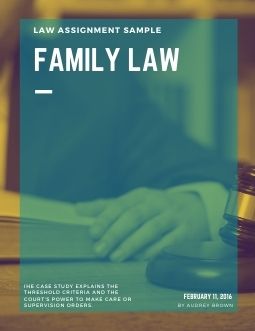
You can download the sample Law case study on Family Law with the following question for free at the end of this page. For further assistance in Law Assignment help, please check our offerings in Law assignment solutions. Our subject-matter experts provide online assignment help to law students from across the world and deliver plagiarism free solution with free Turnitin report with every solution.
(AssignmentEssayHelp does not recommend anyone to use this sample as their own work.)
Law Assignment Question
1) Is a marriage an outdated institution?
2) L v P case commentary
3)'The government's amendments to the welfare test and the introduction of child arrangements orders will make no difference to how parental disputes over children are resolved.' Discuss, with reference to domestic and international research.
4) Frank and Margot have been married for 10 years and are both aged 37. They have two children, aged 9 and 4.
They live in a four-bedroom house valued at £500,000, with a mortgage of £200,000. The balance of the purchase price (£300,000 eight years ago) was met by a gift of £100,000 to Frank by his father, who had won the lottery. At that time, Frank and Margot agreed in writing that the gift should be regarded as 'belonging to Frank' and that although the home was registered in their joint names, Margot should have a proportionately smaller share of the equity. Frank is an engineer and earns £80,000 p.a. Margot is a qualified nurse who was earning £23,000 when she gave up work on the birth of their first child. She had not wanted to stop working but she and Frank could not afford the child care costs at that time. She is hoping to return on a part-time basis when their younger child starts school in a year's time. If she were to work full-time, she could earn up to £30,000 p.a. They have a car worth £5000. Frank has contributed for 10 years to a private pension scheme which will payout when he retires at age 65; Margot stopped making her NHS pension contributions when she gave up work, but can re-start them if she goes back to nursing. They are divorcing and Frank is living in a two-bedroom rented flat with a new partner, Penelope, who is expecting his baby.
Advise on the financial settlement that a court might order in this case.
5) Write an explanation in plain English on 'The threshold criteria and the court's power to make care or supervision orders'.
6)Write a briefing to Government Ministers evaluating the Law Commission's proposals for reform of the law on cohabitation contained in Law Com 307.
Law Assignment Solution on Family Law
1) Is a marriage an outdated institution?
Marriage, which is referred to by many as a sacred relationship between two persons, has gone through significant changes over the course of history, due to various external factors affecting its dynamics. Various other forms of relationships have received the importance and rights of a marriage, such as a civil partnership was given legality in the case of Wilkinson v. Kitzinger and ors. At the same time, apart from the diversification of marriage as a legal concept, it has also seen destructive trends, especially in the recent times when not just in the UK but the world over, the number of divorces has increased significantly. People supporting the ideology that marriage is an outdated institution substantiate their assertion by the decreasing number of successful marriages and the increasing number of divorces, showing a trust deficit between the members of families in which marriages have taken place. The modern world has also seen a large number of people being in live-in relationships so as to avoid the implications (legal or otherwise) and hassles of a marriage…
Read more in the complete solution PDF document at the end of this page.
2) L v P case commentary
Issue of the case: In 2011, the family division court in the UK decided the case of L v P [2011] EWHC 3399 (Fam) which was a landmark judgment as regards the legal disputes questioning the validity of the consent of a minor. The case went first before the Peterborough Family Proceedings Court but was later transferred to the Peterborough County Court. Multiple hearings on the matter took place and eventually the case was transferred to the High Court where it went before Mr. Justice Hedley, showing that the case was of grave importance. In the case of L v P, the issue at hand was whether it was legal to require a 15 year old girl (a minor as per the laws) to give her DNA test in order to determine whether the person in question was indeed her father. The courts were entrusted with the responsibility to decide whether a child (or even a major for that matter) had the ability to absolutely deny consent given that he or she was aware of the consequences of such denial of consent, as under Section 23 of the Family Law Reform Act, which deals with the failure to comply in giving a blood test and states at the outset that 'Where a court gives a direction under section 20 of this Act and any person fails to take any step required of him for the purpose of giving effect to the direction, the court may draw such inferences, if any, from that fact as appear proper in the circumstances.'. What had to be considered in the context of this case, was whether going ahead with the DNA test or not, would promote the welfare of the child in question or do the opposite. Additionally, the court had to consider whether the child refusing to give consent for the DNA test was of sound understanding as to judge her own welfare…
Read more in the complete solution PDF document at the end of this page.
3) 'The government's amendments to the welfare test and the introduction of child arrangements orders will make no difference to how parental disputes over children are resolved.' Discuss, with reference to domestic and international research.
In so far as the welfare test is concerned, it is laid out in the Children's Act, 1989 in Article 1 itself, the principle adopted by the legislature and the courts, especially when due regard is paid to the Matrimonial Causes Act 1973 is that in a dispute concerning a family, first regard must be paid to the needs of the children. However, in practice, what has been observed from the various decrees and orders passed by the courts is that the courts have, even in trying to give due regard to the considerations of the children first, failed to pay adequate importance to the needs of the children. This is consequential to the fact that the construction of the article pertaining to the welfare test is lacking, thereby giving the Judge ample opportunity to disregard adequate considerations of children so long as he places the considerations, whatsoever he may regard them to be, first in terms of priority. Therefore, regardless of what amendments may be brought to Section 1 of the aforementioned act, so long as there is no overhaul in its essential construction, it will not make a difference to how parental disputes over children are resolved…
Read more in the complete solution PDF document at the end of this page.
4) Financial Settlement Advise
In this divorce proceeding, the important ingredients would be the rights of the children involved, the rights of the parties to the marriage that is Margot and Frank, the rights of the parties to the marriage and the children with respect to the house, the car and the private pension scheme. The court would also consider the liabilities of the parties with respect to the mortgage on the house. Further, the court would be considering any periodic sums of payment to be made to the parties or the children in need, of as much amount and time as it may deem fit.
In trying to reach a financial settlement between two divorcing parties, it is in the spirit of the laws governing matrimonial disputes in the UK that due regard must be paid to the children and the parties to the marriage. Part II of the Matrimonial Causes Act, 1973 (hereinafter referred to as the Act) governs the procedural and substantial rights of the parties to a marriage (and the children therein) upon a divorce, with respect to the financial settlements. Section 21[1] and Section 23[2] of the Act empowers the courts to decide matters with respect to property and maintenance.
Section 25[3] of the said Act states that due consideration must be paid to the child first, by the court, during the financial settlement between parties to a marriage. It states that 'It shall be the duty of the court in deciding whether to exercise its powers under section 23, 24[4], 24A[5] or 24B[6] and, if so, in what manner, to have regard to all the circumstances of the case, first consideration being given to the welfare while a minor of any child of the family who has not attained the age of eighteen.'(Emphasis supplied)…
Read more in the complete solution PDF document at the end of this page.
5) Write an explanation in plain English on 'The threshold criteria and the court's power to make care or supervision orders'
Section 31 of the Children Act, 1989 gives the courts in the UK the power to designate a local authority to take care of a child. Under this section, the courts may either put the child under the custody of a local authority or assign him the duty of taking care of the child. The courts may also put him under the supervision of such a local authority.
In order to have a child put under the supervision of such a local authority, the legal procedure to be followed is that an application must be made under Section 31 of the Children Act, 1989.
The situation which might compel the courts to make such an order would be when the court feels that the child is either prone to danger or harm while being in the custody of his parents or that the child is not in the control of the parents…
Read more in the complete solution PDF document at the end of this page.
6) Write a briefing to Government Ministers evaluating the Law Commission's proposals for reform of the law on cohabitation contained in Law Com 307.
Law Com 307 is a report by the Law Commission, which brings about required reforms in the laws relating to cohabitation. It recognizes that before this report, several myths with respect to the laws relating to cohabitation have existed in the UK, such as the belief that the relationship between two persons living together after a certain period of time would enjoy the same rights as that of a marriage. It also brings about changes with respect to the rights of the children as before this report, the standing of the laws is such that there is no substantive provision in so far as the rights of children is concerned when the nature of the relationship between the parents is debatable…
(Some parts of the solution has been blurred due to privacy protection policy)


 WhatsApp Us
WhatsApp Us